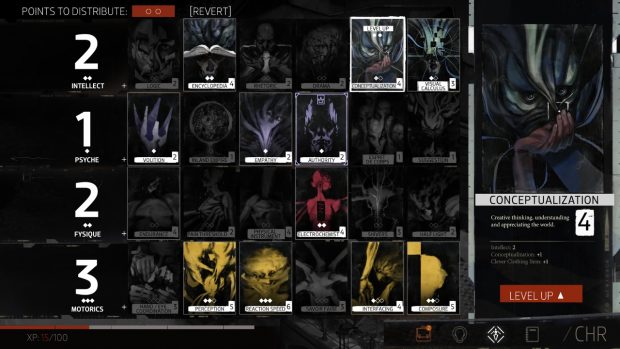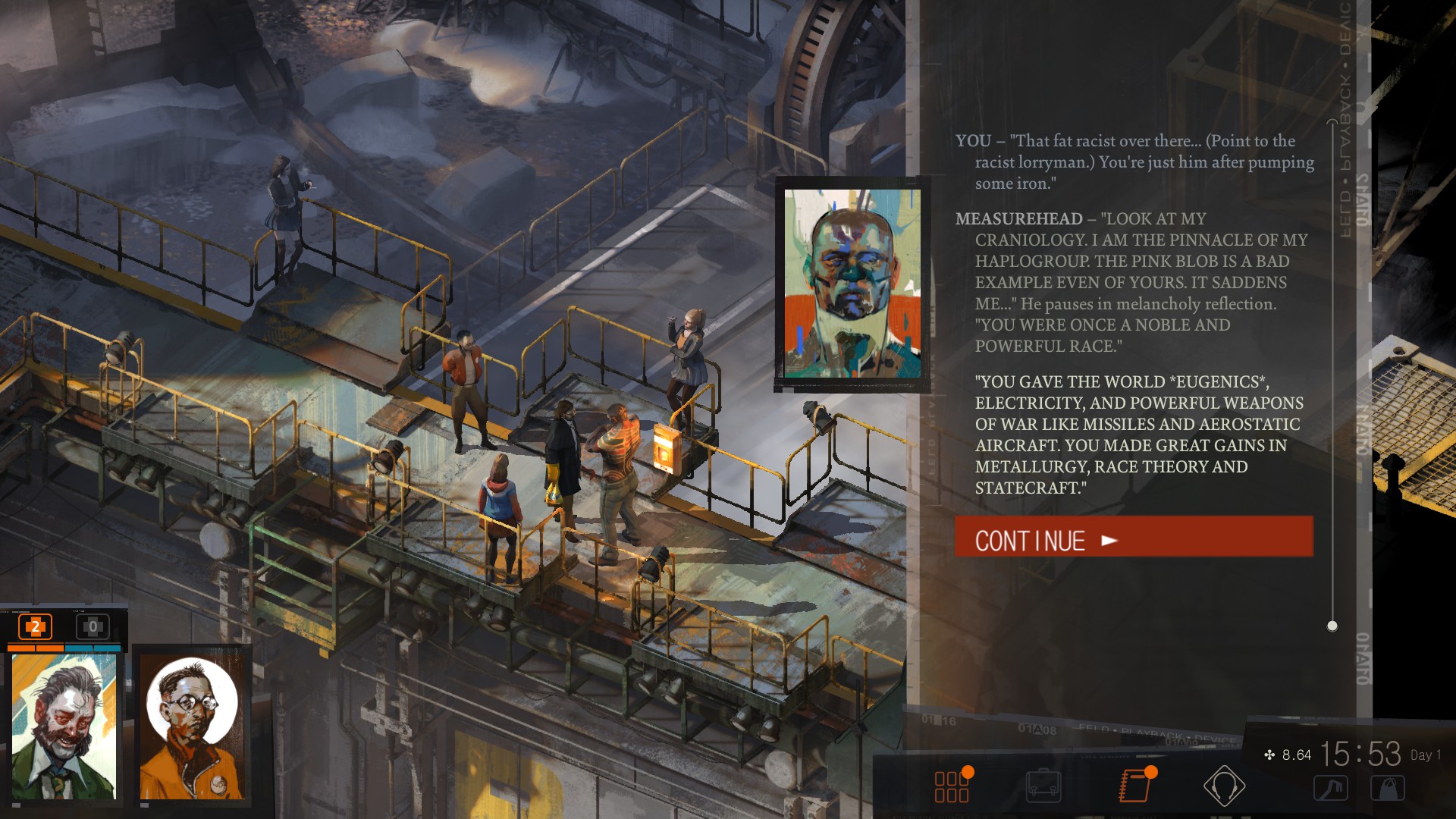
A particularly potent analogy for depression is that of an ever-growing black dog that you have to drag around with you. A dog that wakes you in the night with inescapable thoughts, that makes you irritable and difficult to be around, one that feeds and screws with your memories and mind. It weighs you down and makes you feel small, invisible to all.
Harry Du Bois doesn’t have a black dog; he has a whole pack of them. He calls them things like Archaic Reptilian Brain, Limbic System and Horrific Neck Tie. They talk to him during both his waking and sleeping moments, feeding him hatred of himself and those around him, of the entire damned world that he lives out his increasingly meaningless existence. Disco Elysium opens with one of these lectures from Harry’s black dogs, as Harry is waking from a bender that would make Pete Doherty ashamed. So gargantuan was the bender that Harry has forgotten his name and his job, with his entire life history having been gobbled from his mind, including the reason that he is borderline comatose in a small motel in the middle of the rundown Martinaise, a district in the city of Revachol. A burning light through a smashed window scratches across Harry’s brain and reveals the trashed motel room that remains from his night of forgotten self-loathing. The core mystery at the heart of Disco Elysium is uncovering those days Harry spent in Martinaise before now and what his life was like before he arrived there.

It’s a set up that will be familiar to most that have played many games in the past, particularly RPGs. The amnesiac hero is a staple of the genre. Disco Elysium though doesn’t proceed to uncover some sort of chosen one future, nor a dark/heroic past, despite what Harry may end up thinking and saying to the world around. Instead, Harry is revealed to be a fairly ordinary cop, one that may well have been good at his job at some point in the past, one that others could well have admired, but nothing to compare to the Revans or Dragonborns of the genre.
As mentioned already, helping and hindering Harry along his path of self-discovery are his black dogs, voices that will encroach upon dialogue and your exploration of the world. Mechanically, this serves as some kind of cross between the games skill system and your companions. That is, a companion system where your companions want you to fail most of the time. These “characters” range from Electrochemistry to Reaction Speed or Inland Empire to Drama, all contributing in some way to how you view and interact with the world. On the skill side, the amount of skill you have in each of these, be it from spending skill points as you level or from the clothing you are wearing, is added to dice rolls and compared to a difficult for the action you are trying to perform. All fairly straightforward RPGing. However, the beauty of the system Disco Elysium’s system is, much like most tabletop RPGs, double 6s on your roll will always pass, whilst double 1s will always fail, no matter what your level is in the checked skill. This can lead to some wonderful moments in which Harry attempts to do something seemingly impossible, such as knock out a 7 foot guard, and miraculously succeed or he could attempt to do something seemingly simple, such as punch a foul-mouthed teenager, and fall on his arse. Potentially, this could have been frustrating, but instead of closing of a path to you failing often just seems to open up a completely new situation. A great example of this presented itself in the opening few minutes of the game. The owner of the motel was demanding money from me. I did what everyone would do in such situations; chose to run away, do a dive, spin mid-air and flip the motel manager off. Alas, my fairly certain skill check failed and I instead went crashing into an old lady in a wheelchair, knocking me out for a couple of hours. I don’t know whether a successful roll would have led to a different path and I suspect it probably wouldn’t have altered much, but it led to conversations with the old lady that at least initially would have felt different had that not happened, as she took pity on this dishevelled loser cop. There are other moments that have a sense of greater weight to them. I’ve only played the game once through and this could just be an illusion, but it feels like there are certainly a few moments that could shape the game quite differently, at least during the final act.

Failure often leads to humorous outcomes too, helping alleviate the annoyance of unsuccessful random rolls. It is probably what will strike you the most during the opening few hours, as Disco Elysium is one of the funniest games I’ve ever played. Yet, as you continue your journey through Martinaise and see how much Harry’s time there has been a series of misfires, prat-falls and tone-deaf karaoke, it becomes increasingly poignant as you unearth more. For this is a tale of lost love, depression and suicidal shouts for help, buried beneath Harry’s assurance to everyone that he is the law.
Harry’s mind is also spilling out around him, as Martinaise soon becomes a microcosm of what is going on inside of him, being as fractured and conflicting as his own thoughts. A place that has been ravished by a failed revolution, left with some still hunting for that workers’ paradise and others that despise the encroaching spread of foreign cultures and people in Revachol. Factions despise each other with a passion. Even when there is a loving friendship that involves enjoying the odd game of boule, there is always that history not far away to keep you apart. Sometimes this may make the game feel nasty at times, with no real voice of its own, as it attempts to give all sides a voice, whilst at the same time painting them all as selfish, unpleasant or manipulated. The game displays racism regularly, even encouraging the player to engage in it at times, as well as repeated use of a homophobic slur not just isolated to a single character (a slur that is bleeped with each use, which only serves to highlight it more). For many, this might be viewed as the game wanting to provoke, whilst failing to commit to a side. You could also see it as the game allowing the player to express their own views (or the views of their version of Harry), no matter how extreme they might be. Really though, it is demonstrating the fractured nature of the protagonist’s mind, conflicting voices in his head leading him down paths that he may have been nothing more than fleeting thoughts when his mind was more stable. Those black dogs have grown louder though and now effected the way he views the world around him. The game, perhaps fortunately, never overtly goes down that path of the world being nothing but a figment of Harry’s imagination, but that sense is implicit from the start.

It is perhaps a shame that the main case you are sent to investigate in Martinaise is not the most thrilling. The story of a mercenary that is found hung outside a motel has some suitable hooks to sink into the player, but it never leads to anywhere hugely interesting and the final act takes you off to another path that appears almost from nowhere (albeit one that is rather obvious when you take more than a cursory glance at the map). The direction the game takes you in for the majority of its time is not much more than a red herring, so it does fail in its murder mystery set up.
It is in the side stories that this main mystery takes you down that the game excels though. The characters you meet when performing your investigation are fantastically varied bunch, all with their own agendas and motivations. Many of these characters tie into your central investigation, but many are just living their lives in Martinaise and Harry may help them out. Whether that is finding out why businesses are regularly failing in the region, locating a missing husband or two, or converting an old church into rave club, there is a multitude of different stories to find out about and for Harry to pretend to be the superstar cop that he longs to be.
There is also plenty of dialogue to wade through, although it never feels like a chore. Unlike many games, the writing in Disco Elysium is regularly engaging and enjoyable to go through, delivered in reasonably proportioned bite sized chunks. As this is an RPG that features no real combat sequences, all of the action needs to take place through this dialogue and with that the game excels. It is a real joy to find a game that isn’t afraid to truly embrace dialogue and not be afraid to shun combat with a gun in exchange for battling people with words. So much so, that much of the first half or so of the game is you hunting for your misplaced firearm, a firearm that rarely has any need to be drawn even when you do find it.

Disco Elysium is a game that delves deep into machismo and male depression. What initially felt like a game that revelled in its foolishness and absurdities, ultimately ended up having moments that hit me hard. When those moments include two people sitting on a bench waiting for the tide to roll out so they can reach a crashed car, you know that you are experiencing something completely unique in the game-sphere. I laughed and shed tears on multiple occasions throughout my time with the game.
Disco Elysium 2 was announced not too long before the first game was released. The initial talk of them wanting to do and achieve so much more with the game and world than they could with the first had me slightly worried about the possibility of ambitions that may need restraining. I should never have worried. Their first game has a few flaws, but it is nevertheless a masterpiece. Whatever ZA/UM do next, I’ll be right there to see it.